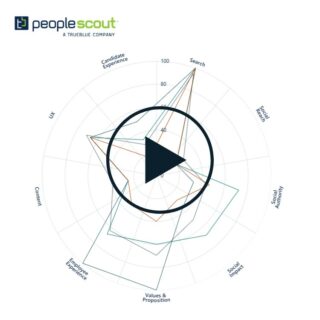Marc Miller, president and founder of Marc S. Miller Associates HR Technology Consulting, gave the presentation “HR’s Strategic Shift: How to leverage HR technology to drive results for your Healthcare organization” at the Healthcare Talent Acquisition and Management Summit held in New Orleans earlier this year. Miller’s presentation covered a wide range of topics related to HR technology and its impact on healthcare HR professionals. Below, we take three items from Miller’s HR technology “to-do” list and explore the ways in which emerging healthcare HR technology is helping achieve success in these areas.
Leverage Healthcare HR Technology to Reduce Time Spent on Administrative Tasks
Administrative tasks are the backbone of a well-run healthcare organization’s HR department. They put into action the ideas and concepts developed during HR strategic planning and include educating employees on benefits, keeping employment records and processing essential paperwork, from job applications to time sheets and travel per diems.
Dig Deeper
How RPO Can Solve The Top Challenges In Healthcare Talent Acquisition
Keeping up with administrative tasks can be daunting for healthcare HR professionals. This may be why more and more HR professionals are turning to HR technology to alleviate some of the burdens. A robust HR technology platform can help manage many basic HR functions — including payroll, benefits, employee onboarding and time off tracking. An HR technology platform will also organize these tasks into categories so users can easily navigate information from a single platform. With multiple HR functions organized in one space, healthcare HR departments can be more efficient and productive in handling administrative tasks.
Before sitting down with potential vendors, healthcare staffing teams should outline a list of questions including:
- Will the platform integrate with current systems?
- How secure is employee data inside the platform?
- Will the vendor or a third party be involved in training staff on the technology?
- What proprietary features does this platform offer?
- Is the interface easy to navigate?
- How customizable is the platform?
- What ongoing support can be expected of the vendor?
Outsource Important HR Functions to Tech-Capable Partners
While HR professionals are adept at managing a wide variety of critical HR functions, there are only so many hours in a day to get things done. Outsourcing HR functions to companies who possess the know-how and technology to manage them efficiently can help maximize productivity. In fact, according to a SHRM survey, 18 percent of companies surveyed outsource HR functions to take advantage of technological advances.
For instance, in the healthcare industry, attracting and retaining qualified talent can be challenging. Competition is fierce. The Bureau of Labor Statistics believes the total healthcare labor market will grow to 22 million jobs, or a 29 percent increase in overall employment, in the next decade. What’s more, according to a SHRM survey, 46 percent of HR professionals reported it was “very difficult” to fill full-time roles for high-skilled medical positions such as nurses, doctors and specialists.
To brace for the looming surge in demand for healthcare talent, HR professionals should look to recruitment outsourcing as a viable and necessary solution. Talent acquisition experts at recruitment process outsourcing (RPO) companies can manage healthcare recruitment. A healthcare RPO provider can deliver a comprehensive assessment of the whole talent spectrum and can source and hire clinical and non-clinical healthcare workers.
The right RPO provider can employ cutting-edge talent acquisition technology to help manage all aspects of the recruiting process, from identifying talent to creating a more efficient applicant experience. For example, AffinixTM, PeopleScout’s proprietary talent technology platform, combines AI, predictive analytics and machine learning to deliver speed and scalability to a user’s recruitment process. Affinix can also improve candidate experience with a mobile-first application process, digital assessments and video interviews. If you would like to learn more about Affinix, please download our fact sheet here.
Use Healthcare HR Technology to Organize and Track Metrics
Tracking HR metrics is important for healthcare HR professionals and leadership teams looking to better understand the health and vitality of their organization and its workforce. However, according to research conducted by XpertHR, 95.5 percent of HR professionals have experienced problems gathering and analyzing HR metrics data.
HR technology can make tracking, measuring and analyzing the value of employees easier. Advances in technology such as HR dashboards allow organizations to gather data better. An HR dashboard can be used to analyze performance and identify areas for improvement in an organization. Executives and HR leaders can work together to review the data they need in order to make fact-based decisions when it comes to the development and management of HR and personnel resources. We have outlined some measurement best practices:
Keep HR metrics focused
Even though technology has made it easier to gather and report HR metrics, it is still important to be discerning and careful about what metrics are measured and reported on. Healthcare HR professionals should focus on tracking metrics that directly impact key performance indicators. This can be achieved by determining the key factors impacting an organization’s staff from turnover to employee satisfaction to tell the story of what is happening with employees.
Align reports with the organization’s strategic goals
Healthcare HR professionals need to be deliberate about aligning metric analysis with overall organizational goals. This is important to show how HR programs are driving progress and helping the organization reach its strategic goals as well as illustrating the value and impact employees make every day.
Use metrics to drive executive action
One of the main objectives of reporting key metrics is to compel the executive team to take action on HR-related issues that may need attention and improvement. Healthcare HR professionals need to be sure to illustrate where employees are struggling as well as the progress of HR programs to give leadership a clear picture of where to allocate resources.
Conclusion
The world is rapidly evolving with apps, big data, real-time communication and increasing use of artificial intelligence, chatbots and predictive analytics playing a larger role in our everyday lives. These technologies are quickly bringing new functionality to the world of HR. The future success of healthcare HR professionals will be directly linked to how well they adapt to new developments to create and design the healthcare workforce and employee experience.



